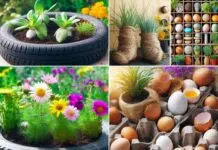The Best Gardening Tips for Beginners: Cultivate Your Green Thumb
Gardening is a rewarding and therapeutic hobby that can transform a patch of soil into a beautiful and fruitful oasis. If you’re a beginner looking to venture into the world of gardening, here are some essential tips to help you get started on the right foot.
1. Start Small
For beginners, it’s easy to get overwhelmed with the idea of creating a massive garden. Instead, start with a small plot or a few containers to hone your skills and gain experience. As you become more confident, you can expand your garden and take on more ambitious projects.
2. Choose the Right Location
Selecting the right spot for your garden is crucial. Most plants require a minimum of six hours of sunlight per day. Before you start planting, observe your chosen area for a few days to ensure it gets adequate sunlight. Additionally, consider the soil quality and drainage in the area. Avoid low spots where water may pool, as this can lead to poor growth and root rot.
3. Pick Suitable Plants
As a beginner, it is wise to start with easy-to-grow plants that are well-suited for your region. Some popular choices for beginners include:
- Vegetables: tomatoes, lettuce, radishes, and zucchini
- Herbs: basil, mint, and parsley
- Flowers: marigolds, sunflowers, and zinnias
Consult your local nursery or garden center for advice on which plants thrive in your area.
4. Invest in Quality Tools
Quality gardening tools will make your work more comfortable and efficient. Some essential tools for beginners include:
- Hand trowel
- Pruner
- Garden gloves
- Watering can or hose with adjustable nozzle
- Rake
As you gain experience, you may want to invest in additional tools such as a spade, garden fork, and wheelbarrow.
5. Prepare Your Soil
Healthy soil is essential for a thriving garden. Before planting, turn and loosen the soil with a fork or tiller to aerate it and encourage the growth of beneficial organisms. Add organic matter such as compost or well-rotted manure to improve soil structure and provide essential nutrients.
6. Learn About Companion Planting
Companion planting is the practice of placing plants together that benefit each other. Some plants can repel pests, while others may improve soil nutrients or attract pollinators. Research which plants works well together to maximize the health and yield of your garden.
7. Water Wisely
Proper watering is crucial for your plants’ health. Overwatering can lead to root rot and the spread of disease, while underwatering can stress plants and reduce yields. Water your garden in the early morning or late afternoon to minimize evaporation. Focus on the roots, as wetting the foliage can encourage the growth of mold and mildew.
8. Stay on Top of Weeds
Weeds compete with your plants for nutrients, water, and sunlight. Regular weeding will help keep your garden healthy and productive. Hand-pulling or using a hoe are effective ways to remove weeds. Adding a layer of mulch can also suppress weeds and help retain moisture in the soil.
9. Keep a Garden Journal
A garden journal is an excellent tool for tracking your garden’s progress and learning from your experiences. Record important information such as planting dates, varieties, fertilization schedules, and pest issues. This information will be invaluable as you plan and improve your garden in the coming years.
10. Be Patient and Enjoy the Process
Gardening requires patience and perseverance. You may encounter setbacks, such as pests, diseases, or weather-related issues. Embrace these challenges as learning opportunities and enjoy the journey of nurturing your garden.
By following these tips, beginners can cultivate a thriving garden and develop a lifelong passion for this rewarding hobby. Happy gardening!
Read More: Tower Garden: A Revolutionary Way to Grow Fresh and Healthy Produce at Home










